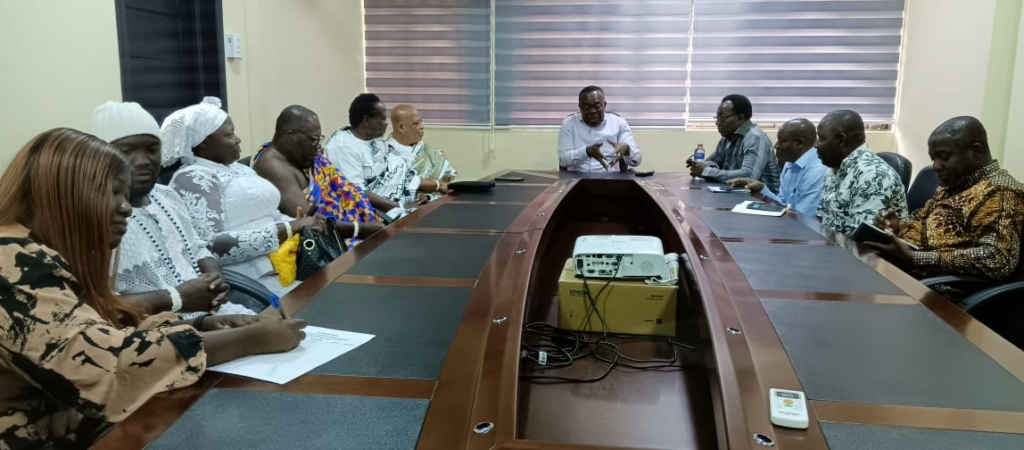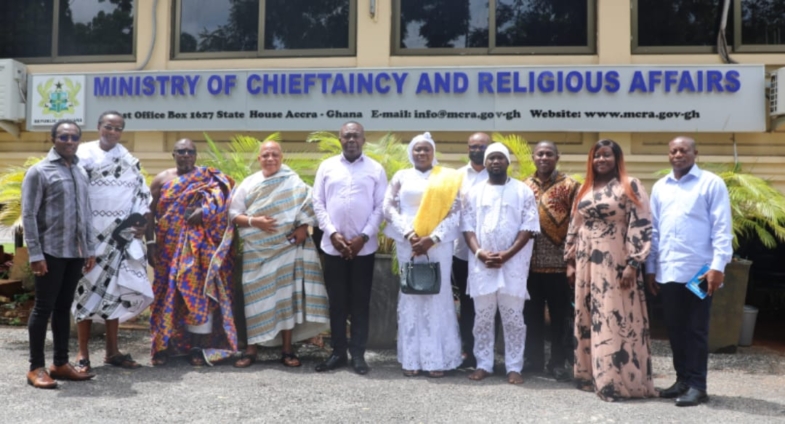A six-member delegation from the Nungua Traditional Council has paid a courtesy call on the Minister of Chieftaincy and Religious Affairs, Stephen Asamoah Boateng.
The visit was to express appreciation to the minister for his participation in this year’s sacred maize ceremony ahead of the Homowo Festival.
According to the delegation, the chiefs and people of the Nungua Traditional Area were full of praise for the sector minister, as this is the first time a minister from the Ministry has participated in the ceremony in such a manner.

The delegation was also thankful to the minister for his leadership role in calming tensions during the alleged marriage between Wor-Lumor Konor Nuumo Barketey Laweh Tsuru (Gborbu-Wulomo-Shitse), the Gborbu Wulomo, and a teenager, Wor Yoomo Naa Ayemuerde (Wor Dukon Yoo).
“The Hon. Minister's involvement in that situation has helped calm nerves,” the delegation noted on June 6.
In his response, the Minister accepted their appreciation, indicating that his role in resolving the alleged marriage situation and his participation in the sacred maize ceremony were all part of his duties as a sector minister.
He assured them that his doors are always open and that they could count on him for any support.
Background
Stephen Asamoah Boateng joined the Chiefs and people of Nungua in the Greater Accra Region on May 26, 2024, to re-enact a journey from Oyibi to Nungua on foot to bring home a sacred maize to pave the way for the annual Homowo festival. He is the first Minister for Chieftaincy and Religious Affairs to join in this year's sacred maize rites.
The annual pilgrimage marks the re-enactment of the journey from Egypt by the Ga Dangbe people when the land of Israel was hit by a severe famine during the days of Jacob in the Bible.
The annual pilgrimage to Oyibi ahead of the annual Homowo festival is to bring a sacred corn which paves the way for the Gadangme people to celebrate the Homowo festival.
Oral tradition says the Gadangme people were also in Egypt with the Jews, made away with some of the seeds, and planted them anywhere they settled during their migration. The final place it was planted is Oyibi near Dodowa in the Greater Accra Region.
The pilgrims walk barefooted from Oyibi to Nungua, carrying the corn in white calico, followed by another man carrying twelve sticks and other twelve men holding sticks representing the twelve tribes of Israel.
The pilgrims walk from Oyibi, through Katamanso, Santeo, Borteyman, through the Motorway and Spintex, and finally arrive in Nungua.
During the journey, several rites are performed at places like Onyaa Akua, Katamanso, where the former Greater Accra Regional Minister, Hon. Nii Laryea Afotey Agbo, who is now the Regent of Katamanso, performed his rites.
Others include Santeo, and then Batsonaa, where bells were placed on the feet of the carrier of the corn.
Latest Stories
-
‘In Mahama’s era students lacked chalk, but are now receiving tablets’ – Bawumia
8 mins -
Project commissioning not a ploy to attract votes – Oppong Nkrumah
10 mins -
CBG records GH¢1bn revenue in Q3
12 mins -
Mahama vows to create an agro-processing zone in Afram Plains
26 mins -
Political parties should plan for losses, not just wins – IGP advises
28 mins -
524 Diasporan Africans granted Ghanaian citizenship in ceremony
29 mins -
Mahama urges Afram Plains North residents to avoid ‘skirt and blouse’ voting
31 mins -
Asantehene receives more 19th century gold ornament and regalia
38 mins -
Hohoe Ghana Blind Union organises training for members ahead of Election 2024
45 mins -
Alan Kyerematen reveals his future plans for Ghanaian Health professionals
46 mins -
AAIN empowers women and small enterprises in Upper East Region through SHINE project
47 mins -
Akufo-Addo leads nationwide commissioning of 80 educational projects
53 mins -
Ghana and Seychelles strengthen bilateral ties with focus on key sectors
1 hour -
National Elections Security Taskforce meets political party heads ahead of December elections
1 hour -
Samsung’s AI-powered innovations honored by Consumer Technology Association
2 hours

